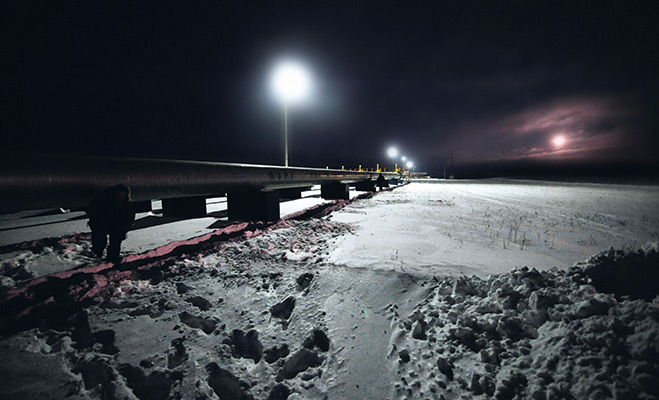Joint venture resubstantiates BP and Rosneft
BP’s deal with state-owned energy giant Rosneft will strengthen the Russian firm’s position and respectability, says Jinan Harb

For years BP has been struggling with a joint venture that made it a business partner with the AAR consortium of Russian billionaires. Now board members have found a strategic way out through a cash-and-shares deal worth £16.8bn, which will make them shareholders in a state-owned Russian energy giant. The arrangement sees Rosneft buy the British multinational out of TNK-BP for £10.6bn and a 12.84 percent stake: an arrangement that ranks as the third-largest in the history of the oil industry. In further advances, Rosneft also plans to buy AAR’s 50 percent share for a rumoured £17bn, seeking the entire takeover of TNK-BP within the next six months.
The transactions reveal the Russian firm’s aspiration to become one of the world’s most powerful oil companies. If successful, they will pass ExxonMobil to become the world’s largest publicly traded producer of oil and gas in terms of output. The developments establish opportunities for expansion for both British and Russian counterparts on a number of levels, but significant challenges are ahead as the exact strength and profitability of the contracts are yet to be determined. If nothing else, breaking away from the problematic partnership within TNK-BP will be warmly received by BP management, as any recent lucrative potential in Russia has been overshadowed by a challenging relationship with the AAR.
Russian affairs
Forming this alliance will undoubtedly open more doors for BP, particularly within Russia: a key site in the oil and gas industry. The deal will allow one of the largest companies in the world the exposure it needs to break into the market significantly. It will also be able to continue its decades-long exploration of Russia’s extensive energy and untapped hydrocarbon reserves.
Ildar Davletshin, an oil and gas analyst at Renaissance Capital, said the deal “strategically looks very positive for BP [as it exchanges] a private partner for a strategic national company which has much bigger access to resources in Russia and has much bigger political support in this country”.
As part of the deal, the BP board have also been given two out of the nine places on the Rosneft executive board. Despite that not being enough to warrant a veto, this does suggest a certain degree of power for planning growth steps and sharing projects.
Although BP has as yet denied the prospect of direct collaboration with Rosneft, by
guaranteeing a share in the larger company it will now secure itself as the partner-of-choice for future joint ventures, undermining the power competitors have within the region.
In the past, rivals such as Royal Dutch Shell have expressed desire to expand their eminence in Russia, but analysts now expect that the BP-Rosneft partnership will ward off others.
Robert Van Batenburg of Louis Capital Markets said: “for foreign oil companies seeking to expand production and reserves, Russia is now off limits.”
This will give BP a very strong position within the region, something that is particularly important as Russia is one of the leading oil and gas producers and exporters. Recruiting BP, now the second-largest stakeholder in Rosneft, will help the Russians strengthen their position within the wider industry.
Benefits and objections
Rosneft has a lot to benefit from BP’s international brand and presence, and will undoubtedly exploit its offerings to implement more efficient and advanced projects and raise its status as an oil and gas expert. Further to this, BP has an immense supply of skills within engineering and technology that Rosneft can utilise and build upon.
The British oil specialist also has a reputation for transparency and management expertise, and the Russians may well seek to benefit from this to enhance their reputation in order to raise capital from international investors. As Rosneft’s reputation improves and shares grow, BP’s stake in the wider business is set to increase in value. The British conglomerate is rumoured to be reinvesting some of the cash from the deal to increase its stake in Rosneft to almost 20 percent.
Many of BP’s investors are still unconvinced about what may happen to their investments as they are put into Rosneft. Whilst TNK-BP has seen interrupted growth since its formation, Rosneft’s shares have not moved in years. Reservations regarding their dividends influenced BP’s shares soon after the deal was announced, as they declined 0.3 percent.
BP, however, has vowed to offset any dilution to earnings per share caused by the deal, which is likely to cost it around £3bn to £6bn. BP managers are still trying to reassure uncertain shareholders, saying that their cash payment and share of almost 20 percent equity, coupled with Rosneft’s payout policy – which promises 25 percent of earnings – suggests BP is well on track to a healthy dividend this year. BP’s Group Chief Executive Bob Dudley said: “BP intends to be a long-term investor in Rosneft: an investment which I believe will deliver value for our shareholders over the next decade and beyond.”
Government support
Initial analysis of the contributing factors suggests there are sufficient benefits on both sides to ensure full exploitation of oil reserves and return healthy profits. Input from the Russian government so far has been full of support as the deal puts the state back on the map as an important player within the energy industry. President Vladimir Putin said: “This is a good, large deal that is necessary not only for the Russian energy sector but also the entire economy. This is a very good signal to the Russian and international energy markets. I am certain that it will be beneficial.”
It remains to be seen whether the new partnership can fulfill expectations to gain international recognition within the oil industry as its frontrunner.













